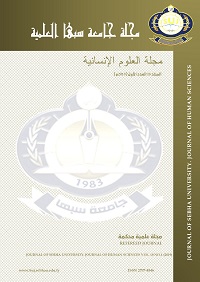Enlightenment in the eighteenth century and the impact of rationalism in it
DOI:
https://doi.org/10.51984/johs.v20i2.1714Keywords:
Church, Mind, Enlightenment, FreedomAbstract
Through this research, we dealt with a topic within the framework of the research on the nature of the Enlightenment and the rational direction in it. The study was limited to the period of the Enlightenment in order to see the role that the mind played in this period "the eighteenth century" and then the possibility of relying on it in building any civilization, so the mind is our way to reach the truth behind the apparent, and we were also exposed to the principles of the age of enlightenment that he advocated, and proceeded from, and the most important one was the principle of freedom. It is well known that the mind was before the age of the Enlightenment under the constraints of its chains with the church, those restrictions prevented "Copernicus" from presenting his theory that changed the world and suppressed the belief that was prevalent. After him, "Galileo" and "Kepler" came to confirm its authenticity; the church did not accept any theory inconsistent with the prevailing religious beliefs. We also discussed through this study the reasons that led to the emergence of the Enlightenment, so the main reason was the domination of the Church as we mentioned earlier, even though the Christian is a heavenly religion that calls for equality between people, while the Church has installed itself as a guardian of this religion and prohibited any ideas that contradict the ideas of Patlimous who said that the universe is fixed and the Earth forms the center of the universe, around which the sun revolves. The ideas and principles of the Enlightenment philosophers and thinkers were influenced by the philosophical ideas - which preceded or coincided with them, such as "Bacon", which relied on his access to scientific facts on extrapolation. And by taking nature as a field in which the mind takes off, and by using freedom as a principle, as the research refuses to submit to any religious or political authority, and by specifying it to advance as a goal and a mean that seeks to provide a better life for this human.
Downloads
Downloads
Published
Issue
Section
License
Journal of Humanities Policy on Intellectual Property and Plagiarism
1. Commitment to Intellectual Property and Ethics
The Journal of Humanities (JOHS) is fully committed to respecting intellectual property rights and aims to protect the originality and authentic work of authors who submit their manuscripts for publication. The journal takes a firm stand against articles that contain any form of plagiarism and emphasizes the need for all researchers to adhere to the highest ethical standards in scientific research.
2. Anti-Plagiarism Policy
The journal considers plagiarism a serious violation of academic ethics. Therefore, authors must ensure that their work is original and not plagiarized, and that any use of external sources is properly cited and documented according to correct academic standards.
-
Actions Taken: In the event that any plagiarism or academic theft is discovered in a submitted article, the editorial board will contact the author to request a formal explanation within a maximum period of two weeks from the date of notification.
-
Investigation and Decision: After receiving the explanation, the article will be referred to the journal's specialized committees, which will investigate the matter and take the necessary measures, which may include the permanent rejection of the article and the imposition of disciplinary actions.
3. Publication License and Author Rights
The journal adopts the Creative Commons license type Attribution-NonCommercial-NoDerivs 4.0 International (CC BY-NC-ND 4.0), which allows for the following:
-
Attribution: Users are entitled to cite the content published in the journal and use it in their work, provided that the original source and author are clearly credited.
-
Non-Commercial: The published content may not be used for any commercial purpose.
-
NoDerivs: It is not permitted to make any modifications, distortions, or to build derivative works from the published content.
Under this license, authors are required to complete an exclusive license agreement for the journal. Authors retain the rights to their research data and may reuse and share their work for scientific purposes with proper citation.







